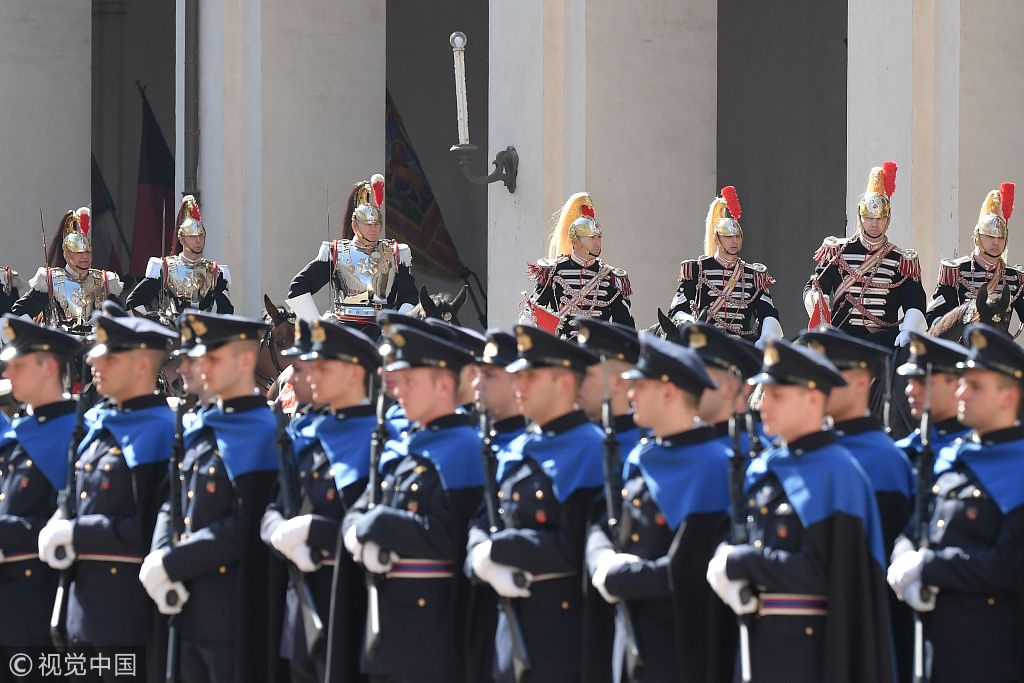
Opinion
12:00, 27-Mar-2019
There is no need to be pessimistic about China-Europe ties
Updated
15:25, 27-Mar-2019
Tom Fowdy

Editor's note: Tom Fowdy graduated with an Msc. in Chinese Studies from Oxford University after majoring in Politics at Durham University. He has published a number of pieces on the international relations of China and the Democratic People's Republic of Korea. The article reflects the author's views, and not necessarily those of CGTN.
Recently Chinese President Xi Jinping met with European leaders Angela Merkel (Germany), Emmanuel Macron (France) and Jean Claude Juncker (President of the European Commission). The meeting comes ahead of the China-EU summit which will commence on Thursday.
During the meeting with the given leaders, Beijing signed up to 45 billion U.S. dollars' worth of deals with France, including a Chinese order for 300 Airbus planes.
The moves came amid constant speculation that China-EU ties were becoming colder, following a published document from the European Commission which sought to paint Beijing's role on the continent in a negative light.

Chinese President Xi Jinping attends a welcome ceremony hosted by French President Emmanuel Macron before their talks in Paris, France, March 25, 2019. /Xinhua Photo
Chinese President Xi Jinping attends a welcome ceremony hosted by French President Emmanuel Macron before their talks in Paris, France, March 25, 2019. /Xinhua Photo
But that isn't really an accurate interpretation of what is happening here. Skeptics are very keen to portray Europe's position as developing in the same path as to what has been seen from the United States, but that clearly isn't the case here.
Although the European Union is complex given it is a bloc of states with varying interests, it is as a whole not hostile to China and is open to growing economic cooperation.
Instead, moves which seem less welcoming to Beijing are in fact typical efforts of the bloc's leading states to uphold the unity and interests of the continent and secure their own way as a "pole" in the emerging international environment. Given this, there is no need to be pessimistic in the path ahead for EU-China ties. With mutual compromises and accommodations, it can very much work.
How can we understand inter-European diplomacy? When we use the term "European" we refer to a common identity, historical legacy and set of values. It does not necessarily refer to geography, nor the individual differences and situations of each state in particular.

Horse guards and soldiers take the position for the arrival of Chinese President Xi Jinping at the Quirinale presidential palace in Rome, Italy, March 22, 2019. /VCG Photo
Horse guards and soldiers take the position for the arrival of Chinese President Xi Jinping at the Quirinale presidential palace in Rome, Italy, March 22, 2019. /VCG Photo
Rather, it refers to a common sense of belonging and vision; that being the broad and somewhat general ideological, normative and civilizational trait which nations of the continent share. This pan-European identity began to emerge following the end of World War II in 1945, creating a consensus that centuries' worth of war, hostility and distrust accumulated in catastrophic results.
Thus, unity, integration and a common mission were perceived as the only way forward. As European integration accelerated over time, France and Germany, once age-old adversaries, would evolve to become the most closely cooperating and tight-knight countries on Earth.
As a result, the European Union, finally coming into force in the 1990s, emphasizes these common values as institutional norms and encourages its member states to find a consensual, pragmatic and unified position on each matter, than to resort to division and chaos.
Each state, of course, has its own specific interests, but when European leaders meet and work together, the greater multilateral good is always emphasized as the most necessary path for the continent, thus a set of common interests above that of the individual. Never has this been more relevant to Europe in today's world. The international environment has rapidly become multipolar.
The United States has treated transatlantic cooperation with contempt, making threats and demands to Europe, rather than standing in solidarity. Similarly, the bloc's ties with Russia are also at post-Cold War lows, while more explicitly, the theme of a rapidly growing China continues to make waves.
As a result, the leading states of the bloc, that is most specifically Germany and France, which have the largest stake in the union's interests and thus the perpetuation of pan-European identity, have been the driving force in the attempt to generate an "EU-wide" approach to China itself.
As the above shows, however, this is not done out of malice, rejection or hostility. Whilst the United States lobbies countries against Huawei and attacks Belt and Road in negative terms with global motivations in mind, all the European Union is looking for is to cooperate with China on equal terms and uphold its own interests as a unified bloc.
As noted, EU leaders strongly feel the bloc has to find its place in the world on its own level rather than to be divided. They want ties with China which will be mutually beneficial.
As a result, there is no need to be pessimistic about Europe's ties with China. The bloc is willing to negotiate, cooperate and engage with Beijing in good standing, as to well to expand economic ties as the latest deal has realized.
While EU states may have their own interests and requests from the country to uphold, such as equal market access, there is ample room for negotiations to approach these issues. Brussels and Beijing can very much find a way forward which is in good, rather than bad faith.
(If you want to contribute and have specific expertise, please contact us at opinions@cgtn.com.)

SITEMAP
Copyright © 2018 CGTN. Beijing ICP prepared NO.16065310-3
Copyright © 2018 CGTN. Beijing ICP prepared NO.16065310-3